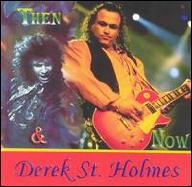A fine rhythm section of bassist Rob Grange and drummer Cliff Davies signed on as well, as the newly assembled Ted Nugent Band toured the U.S. for a few years, and in the process, became one of tightest and most ferocious hard rock outfits in the U.S. The quartet was signed to Epic shortly thereafter, resulting in Nugent's self-titled release in 1975. The album (along with continued non-stop touring) helped establish the group even further, but inter-band friction threatened to derail the group (Nugent wanted to be the sole leader and focus of the attention, while the other members wanted more of a democracy). Just prior to when recording sessions for a sophomore effort were scheduled to get under way, St. Holmes left the group and was replaced by a then-unknown Meat Loaf for 1976's Free-for-All (although St. Holmes managed to appear on some of the recording). While the album was another success, Nugent quickly realized that St. Holmes was better suited for the group and was welcomed back into the band prior to the album's supporting tour.
Nugent's third release, 1977's Cat Scratch Fever, turned out to be the group's big commercial breakthrough, resulting in the Nuge's lone solo hit single (the album's anthemic title track) and further sold-out arena tours. But big-time success only seemed to fuel the problems between St. Holmes and Nugent, resulting in St. Holmes leaving the band for good shortly after the 1978 in-concert set Double Live Gonzo (Nugent continued to prosper for a period, but St. Holmes' exit would ultimately prove detrimental to the Nuge's career). St. Holmes formed a new outfit, Saint Paradise (along with his former Nugent bandmate Grange), who only managed to issue a lone self-titled release for Warner Bros. in 1979 before splitting up as well. Up next for St. Holmes was a collaboration with former Aerosmith guitarist Brad Whitford, dubbed Whitford/St. Holmes. That duo also managed to issue only a lone self-titled release in 1981 for Columbia Records (although another album was completed, it was ultimately shelved) before Whitford returned back to Aerosmith and St. Holmes briefly reunited with Nugent for a tour.
St. Holmes was then invited to join Michael Schenker's band in England, but his participation with the former Scorpions/UFO guitarist only lasted for a pair of albums, Built to Destroy and Live at Hammersmith, as St. Holmes opted to return back home in the U.S. to be closer to his wife and then-newborn baby. St. Holmes spent a few years in the mid-'80s putting together a band in Chicago before reuniting once more with Nugent. St. Holmes continued to tour and record off and on with the Nuge (Nugent's main focus during the late '80s/early '90s was the pop/rock supergroup Damn Yankees, however), including lending his vocals to Nugent's 1995 back to basics release Spirit of the Wild. Soonafter, St. Holmes formed Big People, which was comprised of former Cars bassist/vocalist Ben Orr (who sadly passed away in October of 2000), Billy Joel drummer Liberty DeVitto, plus guitarists Pat Travers and former .38 Special member Jeff Carlisi. 2000 saw the release of St. Holmes' first true solo release, the fine Then Now. ~ Greg Prato, Rovi












